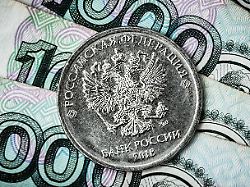Sovereign wealth fund is collapsing
Russian Treasury reports billions hole
4/7/2023 2:17 p.m
The attack on Ukraine is making itself felt in the Russian state budget. The production of military goods keeps the industry running, but cannot compensate for the lack of income from the energy business. Instead, the state fund has to serve, which is gradually bleeding dry.
The Russian state budget slipped deep into the red in the first quarter due to high armaments expenditure and falling income from energy exports. From January to March, the minus was 2.4 trillion rubles (26.5 billion euros), according to the Ministry of Finance in Moscow. In the same period of 2022, another significant surplus of 1.13 trillion rubles was achieved. In the past quarter, revenue fell by 20.8 percent year-on-year to 5.7 trillion rubles. Expenditure, on the other hand, jumped 34 percent to 8.1 trillion rubles.
Increasing production of military equipment and huge government spending are keeping Russia’s industry thriving. They are helping to mitigate the slump in the Russian economy as a result of Western sanctions over the war against Ukraine. Russia invaded Ukraine on February 24, 2022. Western sanctions – including a price cap for Russian oil – are intended to make financing the war more difficult.
Ruble depreciates
At the same time, the Russian national currency has depreciated significantly: the ruble has fallen to its lowest level against the euro and dollar since April 2022. In doing so, he broke the threshold of 90 rubles per euro. The reason, traders say, is a slew of problems, including the sale of Western assets to domestic investors, fueling demand for the dollar. At the same time, low oil prices in March reduced export earnings. The ruble has been the third-worst performing global currency so far this year, behind only the Egyptian pound and the Argentine peso.
According to the European rating agency Scope, lower revenues from oil and gas exports will increase the overall hole in the Russian state budget this year. According to an analysis by the credit rating agency, the deficit is likely to rise to 3.5 percent of gross domestic product (GDP). In 2022, the shortfall was a good two percent. “The sanctions and the war limit Russia’s fiscal flexibility,” emphasized Scope. “This is due to lower export earnings, higher war-related spending and a steady decline in economic output.”
Sovereign wealth fund melts away
However, the state should be able to plug the hole in the state budget for the time being without any major problems. “Russia can finance its deficit relatively easily by using the National Property Fund,” stresses the rating agency. However, this melts away with every withdrawal: by the end of 2024, the fund is expected to correspond to only 3.7 percent of GDP, after having accounted for 10.4 percent at the end of 2021 – i.e. shortly before the outbreak of the war against Ukraine.
Another way to plug the fiscal hole would be to issue domestic bonds to state-owned banks. In addition, the Russian authorities are pushing ahead with their plans for a special tax on corporate profits.
